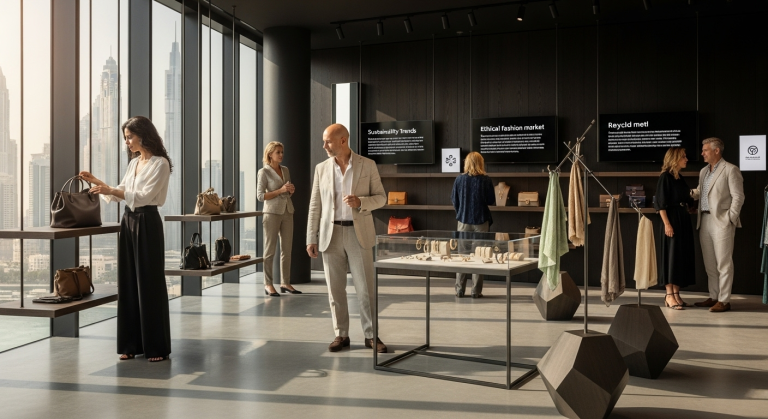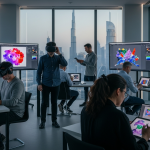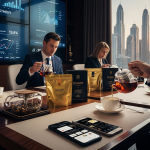Market Analysis and Opportunities
The surge in sustainable fashion accessory production presents a compelling business opportunity in Dubai, a city recognized as a global hub for innovation, luxury retail, and eco-conscious consumerism. As the UAE advances its sustainability agenda—aligned with Vision 2030 and Expo 2020 legacy goals—demand for ethically produced accessories is growing among both residents and international visitors. This section provides an in-depth UAE market analysis, highlighting key trends, consumer behaviors, and strategic opportunities for entrepreneurs aiming to launch or expand a sustainable fashion accessory business in Dubai.
Target Market Analysis
- Market Size and Growth: The Middle East fashion industry is projected to reach $55 billion by 2025 (Statista), with sustainable fashion growing at an estimated CAGR of 10-12% in the GCC. Dubai, as the region’s retail epicenter, is at the forefront of this trend.
- Demographic Insights: The Dubai population is over 3.5 million, with nearly 90% expatriates. This multicultural demographic values exclusivity, authenticity, and environmental responsibility—traits emphasized in sustainable fashion accessories.
- Purchasing Patterns: Millennials and Gen Z, who make up a significant consumer segment in the UAE, increasingly prefer brands with transparent sourcing, eco-friendly materials, and ethical practices.
- Key Industry Trends:
- Digital transformation, with e-commerce fashion sales in the UAE expecting annual double-digit growth (Euromonitor).
- Shift toward circular economy models, upcycling, and locally-sourced materials.
- Celebrity and influencer collaborations driving rapid brand awareness.
Marketing Needs
To gain traction in the saturated Dubai retail market, sustainable accessory brands must invest in comprehensive marketing strategies:
- In-depth market research to identify niche segments (e.g., vegan accessories, upcycled jewelry, tech-integrated fashion items).
- SEO-optimized e-commerce platforms targeting popular search terms like “sustainable fashion Dubai” and “eco-friendly accessories UAE.”
- Multi-channel digital campaigns leveraging social media influencers (Instagram, TikTok), paid search (Google Ads), and targeted email marketing.
- Collaboration with local designers and participation in Dubai Fashion Week and sustainability expos to enhance brand visibility.
For detailed support in launching targeted UAE-focused campaigns, consult Sales and Advertising Services.
Expansion Potential
- Segment Diversification: Expand into corporate gifting, eco-luxury collaborations, and B2B supply for hotels and travel retailers.
- Geographic Reach: Use Dubai as a gateway to the GCC, MENA, and global markets, leveraging free zone export incentives.
- Product Line Growth: Introduce tech-enabled wearables or utilize emerging materials such as Piñatex (pineapple leather) and recycled ocean plastics.
Comprehensive Business Overview
Sustainable fashion accessory production relates to the design, manufacturing, and sale of accessories—such as jewelry, handbags, watches, scarves, and sunglasses—using environmentally responsible materials and ethical labor practices. In the context of business in Dubai, this industry aligns well with local and national sustainability mandates, serving luxury, lifestyle, and conscious consumer markets.
- Industry: Fashion Retail, Sustainable Manufacturing, E-commerce.
- Business Model: Direct-to-consumer (D2C), wholesale partnerships, B2B supply, and omni-channel (physical boutiques + e-commerce) sales.
- Target Audience: Affluent residents, tourists, corporate buyers, and progressive youth segments in the UAE and beyond.
- Operational Scope: Product design, sourcing, manufacturing (local or global), retail sales, and after-sales support.
Mission, Vision, and Core Objectives
- Mission: To deliver high-quality, trend-forward accessories that elevate style while prioritizing environmental and social responsibility.
- Vision: To become the leading sustainable accessory brand in the GCC, recognized for innovation, craftsmanship, and ethics.
- Core Objectives:
- Lead the regional market in sustainable product development.
- Achieve profitability within two years of launch.
- Foster partnerships with UAE-based designers and sustainable material suppliers.
The business is best suited to launch in Dubai’s Free Zones (such as Dubai Design District or JAFZA), leveraging streamlined foreign ownership rules, easy import/export procedures, and proximity to logistics clusters. Most initiatives in this space would be considered startup or early growth-stage ventures.
For hands-on guidance through setup in Dubai Free Zones, refer to Business Setup Services.
Competitive Advantage
Unique Value Proposition and Key Strengths
- Entrepreneur Perspective:
- High entry barriers due to consumer demand for transparency, verified sourcing, and authentic storytelling.
- Ability to tap into Dubai’s support ecosystem, including Dubai SME, Dubai Chamber, and sustainability incubators (e.g., Dubai Sustainable City).
- Adaptable, technology-driven business models for rapid market pivots.
- Investor Perspective:
- Attractive risk-return profile due to rising regional demand and limited competition in fully sustainable segments.
- Potential for rapid scale and exit—Dubai brands are frequently acquired by global conglomerates (e.g., Chalhoub Group, Al Tayer).
- Eligibility for green investment grants and incentives from UAE government initiatives.
- Manager Perspective:
- Operational efficiencies through local production partnerships and access to digital retail infrastructure.
- Exclusive partnerships with sustainability-certifying organizations, ensuring brand trust.
- Ability to attract top design and marketing talent in Dubai’s cosmopolitan talent pool.
Financial and Investment Needs
Financial Requirements
A typical sustainable fashion accessory production business aiming for Dubai market entry would need:
- Setup Costs (AED 200,000 – 400,000): Includes company registration, initial inventory, store or studio setup (physical or e-commerce), legal fees, and branding.
- Marketing Budget (AED 100,000 – 250,000): For launch campaigns, influencer partnerships, and digital advertising during the first year.
- R&D/Design (AED 80,000+): Sourcing sustainable materials, prototype development, and eco-certifications.
- Human Resources (AED 120,000+): Design, production, marketing, and retail staff salaries.
Investment Potential
- Strong ROI potential driven by high product margins typical in luxury accessories and the “green premium” consumers are willing to pay.
- Venture capital, private equity, and impact investment funds are actively seeking sustainable ventures in the UAE.
- Flexible investment structures: Equity (for rapid scale), convertible debt (for early-stage), and co-venture deals.
For tailored investor matchmaking and due diligence, see Investment Consulting Services.
Financial Risks and Mitigation
- High Upfront Costs: Mitigate via phased launches and leveraging grant programs.
- Cash Flow Volatility: Use diversified product lines and B2B deals to stabilize revenues.
- Currency Risk (for imported materials): Hedge major procurement contracts and prioritize local suppliers when possible.
- Legal/Compliance Risks: Protect IP and ensure all licenses are in order to avoid fines or business interruptions.
Human Resources and Recruitment
Workforce Needs
A typical launch team for sustainable fashion accessory production in Dubai includes:
- 2-3 Designers specializing in sustainable materials.
- 2 Production Managers (manufacturing/quality control).
- 1-2 Digital Marketing Specialists for e-commerce and social media.
- Sales and Customer Service Representatives.
Specialist roles such as sustainability officers or supply chain analysts may become necessary as the business scales.
HR Challenges
- Intense competition for creative and technical talent in Dubai.
- Potential cultural gaps between international and local team members.
Strategies to overcome:
- Offer competitive salaries, health benefits, and career growth plans.
- Invest in employee training on sustainable practices and cross-cultural dynamics.
- Utilize Dubai’s freelance visa programs and co-working networks to access top talent flexibly.
Compliance with UAE Labor Laws
- All staff require valid UAE residency visas, labor contracts, and Ministry of Human Resources/Emiratisation (MOHRE) registration.
- Compliance with end-of-service gratuity, annual leave, health insurance, and working hours laws is mandatory.
- Implement audited payroll systems to ensure transparency.
For companies new to the UAE, Residency and Citizenship Services can help streamline visa and compliance processes.
Infrastructure and Operations
Infrastructure Needs
- Flexible office/studio: Launch from a free zone co-working space or retail incubator to minimize fixed costs.
- Advanced hardware and cloud-based design tools (e.g., Adobe Creative Suite, ERP platforms).
- E-commerce platform (Shopify, WooCommerce) with integrated payment gateways and CRM.
Operational Optimization
- Apply lean manufacturing to reduce waste and costs.
- Outsource non-core functions (e.g., warehousing, last-mile delivery) to trusted UAE logistics partners.
- Deploy ERP systems to unify inventory, finance, and customer service flows.
Legal Compliance
- Register the business with the appropriate Dubai authority: Dubai Department of Economy and Tourism (Department of Economic Development), or relevant Free Zone (e.g., D3, DMCC).
- Obtain sector-specific permits for eco-friendly production.
- Open a corporate bank account with a leading UAE bank.
Innovation and Technology
- Utilize digital design and prototyping tools to accelerate product development cycles.
- Leverage blockchain or QR-based tracking for supply chain transparency—a strong selling point in sustainable fashion.
- Pursue collaborations with local startups for IoT-enabled accessories or smart packaging innovations.
Marketing and Branding Strategies
Brand Status
- Brands must establish a compelling visual identity that resonates with Dubai’s luxury-conscious consumers and is aligned with eco-values.
- Educational messaging around sustainability is crucial—share the journey from raw material to finished accessory.
To explore advanced branding solutions, visit Persian Horizon’s services.
Marketing Channels
- SEO-optimized website tailored to “sustainable accessories in Dubai.”
- Active presence on Instagram and TikTok to engage trend-conscious buyers.
- Pop-up shops in malls, resort hotels, and at sustainability-themed events.
Suggested optimizations:
- Invest in video marketing to showcase ethical sourcing and production stories.
- Partner with eco-focused online platforms and regional e-tailers (e.g., Namshi, The Modist).
360-Degree Campaigns
- Run multi-channel launch campaigns combining social media buzz, in-person event activations (e.g., Dubai Shopping Festival), and press coverage in lifestyle magazines.
- Reward sustainability, e.g., offer recycling incentives, host green workshops, or launch loyalty programs for eco-conscious buyers.
For market entry and promotional tactics, see the latest insights on our blog.
Growth and Development Potential
Growth Strategies
- Form strategic partnerships with local designers, artisans, and lifestyle brands to co-create limited editions.
- Expand product lines with seasonally-driven capsule collections tailored to UAE holidays or regional festivals.
- Develop local-to-global e-commerce logistics for GCC and EU shipping.
Networking
- Participate in Dubai Chamber initiatives, regional trade expos, and industry clusters (e.g., Dubai Design District, D3).
- Leverage institutional networks such as the Persian Horizon 57-country partnership to access new buyers and investors.
International Potential
Dubai serves as a launchpad for international trade, benefiting from global air/sea connectivity, pro-business regulations, and trade pacts. Export opportunities to Europe, Asia, and North America are supported by efficient logistics and favorable trade terms.
Sustainability and Innovation
- Align product innovations with Dubai’s Vision 2030 by minimizing carbon footprint, embracing biodegradable packaging, and supporting fair-trade suppliers.
- Join sector-specific accelerator programs (e.g., STARTAD, Sheraa) to access funding and mentorship for sustainable innovation.
Alignment with Dubai’s Market
Cultural Alignment
- Dubai’s population is culturally diverse, necessitating adaptive marketing (bilingual communication, culturally sensitive campaigns).
- Incorporate regional motifs or limited-edition pieces for key holidays (Eid, National Day) to boost local appeal.
Local Regulatory Compliance
- Adhere strictly to all commercial registration, local tax, and employment visa requirements.
- Proactively monitor legal updates to maintain compliance and avoid penalties.
Advantages of Doing Business in Dubai
- Tax-free profits, 100% foreign ownership in most Free Zones, and easy repatriation of capital.
- World-class infrastructure, logistics, and connectivity for regional and global expansion.
- Robust government support for innovation and sustainability sectors.
Local Challenges and Practical Solutions
- High Competition: Combat saturation with differentiated, highly curated product lines and storytelling.
- Operational Costs: Utilize shared production facilities, incubators, and government SME grants to reduce overheads.
- Brand Trust: Obtain and showcase reputable sustainability certifications (e.g., GOTS, Fairtrade).
Conclusion
Dubai’s sustained commitment to sustainability, coupled with a sophisticated consumer market and supportive business infrastructure, makes sustainable fashion accessory production an attractive venture for ambitious entrepreneurs and forward-thinking investors. By embracing digital transformation, sustainable sourcing, and innovative branding, businesses can unlock regional and global opportunities while aligning with Dubai’s eco-conscious trajectory.
Stakeholders are encouraged to leverage local regulatory advantages and Dubai’s world-class facilities, while carefully navigating compliance and human resource challenges. With strategic market entry, a focus on product differentiation, and data-driven marketing, the prospects for scalable growth and profitable investment in the sustainable fashion accessories sector are robust.
For expert guidance in launching or scaling your business in Dubai, from setup and compliance to investment matchmaking, visit Persian Horizon. Our team is ready to help you seize Dubai business opportunities and build a sustainable, globally recognized brand in the heart of the UAE.







